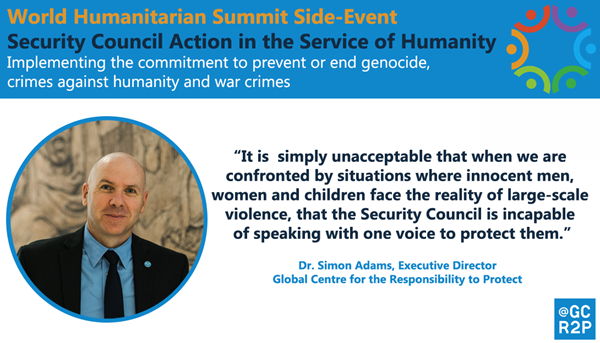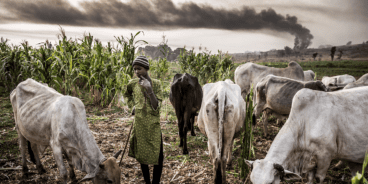Statement delivered at “Security Council Action in the Service of Humanity: Implementing the Commitment to Prevent or End Genocide, Crimes Against Humanity and War Crimes”
Opening Statement, as delivered on 24 May 2016 by Dr. Simon Adams, Executive Director of the Global Centre for the Responsibility to Protect, at the event, “Security Council action in the service of humanity: implementing the commitment to prevent or end genocide, crimes against humanity and war crimes,” hosted by the Foreign Minister of Liechtenstein at the World Humanitarian Summit in Istanbul, Turkey.

Your Excellencies, distinguished guests, ladies and gentlemen, good afternoon. I am honored to moderate this high- level event on “”Security Council action in the service of humanity: implementing the commitment to prevent or end genocide, crimes against humanity and war crimes.” I would like to thank H.E. Ms. Aurelia Frick, Minister of Foreign Affairs of Liechtenstein, and her team for convening today’s meeting.
Your Excellencies, this is a time of tremendous upheaval and human suffering. More than 60 million IDPs, asylum seekers and refugees are currently fleeing conflict, mass atrocities and persecution. In various conflicts today we are observing a brazen disregard for international humanitarian and human rights law. Civilians are being systematically targeted while schools and hospitals are being attacked with impunity. The UN and its humanitarian partners are currently responding to four “level-3” emergencies – the most severe, large-scale humanitarian crises – in Iraq, South Sudan, Yemen and Syria. In all four of these situations we also witness the commission of mass atrocities.
The failure of the UN Security Council to protect civilians from mass atrocity crimes in Syria has severely impaired its credibility in the eyes of the wider UN membership and the public. It is simply unacceptable that when we are confronted by situations where innocent men, women and children face the reality of large-scale violence, that the Security Council is incapable of speaking with one voice to protect them.
In his Agenda for Humanity, the UN Secretary-General calls on Member States to uphold the norms that safeguard humanity by encouraging the Security Council “to politically commit to support timely and decisive action in situations involving the most serious violations and not vote against credible resolutions aimed at preventing or ending them.”
It is in this context that we welcomed the launch in October of last year of the ACT Code of Conduct regarding Security Council action against genocide, crimes against humanity and war crimes. As of today, 111 Member States have endorsed the code, including six of the current elected UN Security Council members, and two permanent members.
We all know that the humanitarian crises of today will not be solved by blankets and bandages alone. Politics remains essential.
Today’s meeting is an opportunity to explore ways to operationalize the Code of Conduct and ensure the Security Council fulfills its political and moral obligation to protect populations from mass atrocities and prevent humanitarian catastrophes before they occur. We must continue to build momentum and ensure that all UN Member States endorse this important initiative. This is just one step towards ending the commission of mass atrocities, but it is an important one.
Read Next

Atrocity Alert No. 445: Sudan, Syria and Eritrea

Atrocity Alert No. 444: Nigeria, Haiti and South Sudan
